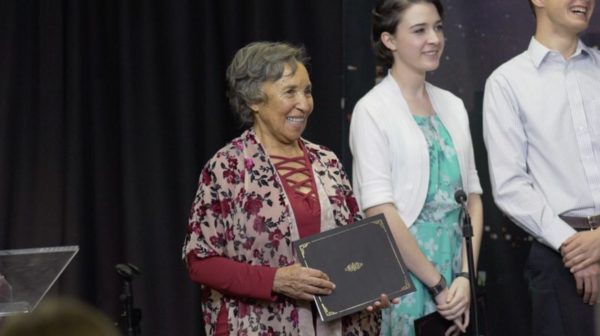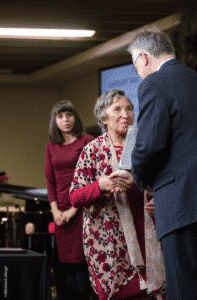
What’s the most valuable advice you have ever received?
Getting off her chair, she walks over to the edge of the room and picks up a magazine. Settling back in her chair, she points to the title and I read the words: Saved to Serve
“If you keep that as your purpose, it’s going to give you a good reason for living. Every day you wake up and say, ‘Lord what am I supposed to do today?’ I would say this is it. Saved to serve.” She laughs softly to herself.
I want to understand what those words mean, and soon it becomes apparent as I listen to the story of Margaret Bam.
***
Margaret’s story begins in the heart of Lesotho. 70 years ago, village midwives gathered round to Mrs. Bam to deliver Margaret in the rural village of Nukong. She became the fifth girl in a family of eight children.
Margaret grew up surrounded by the towering Maluti mountains in northern Lesotho. She describes her earliest memories in detail.
At age five she would follow her mother around as she did her chores of “collecting water from a natural spring, gathering firewood in a nearby forest, or washing clothes in the nearby clear water spring.” She vividly remembers swimming in rock pools, running errands for her mother a few miles away, going to bed with the setting of the sun, family prayers, and rising at the crowing of the roosters to repeat the cycle again.

By the time the last baby was born, Margaret, along with her four older sisters, had been sent to a boarding school in South African. Margaret grew up during the apartheid era, and because her father was Caucasian, and her mother was a Lesotho native, she had to attend a “Colored School.” This made for an interesting childhood. Margaret’s mother had only been had an education of 3 years. By the time her mother was 15, she was married and had already had her first child. But regardless, Margaret describes her mother as a “true Proverbs 31 woman.” Margaret’s father was the manager of a local store called the Trading Post. It supplied many villagers with the basic necessities and was a place where items such as grain and hide skins could be traded in for money. Margaret says: “Because of [my father] we were financially better off than most. He also taught Mama to cook, her food was the most delicious…Dad was the guide to better education, career choices, [and] money management. Mom loved him very much and was thankful for a better life.”
Margaret graduated from high school in 1965 with distinction and was offered a scholarship to continue her education at university. However, she turned the offer down after seeing how much her family had struggled to provide school fees and clothes for her siblings. Instead, she decided to help with the home management.
Though Christianity had been a large part of early family life, as Margaret grew older, she did not find any satisfaction in her current religious experience. She says: “Even though I did all the requirements of the Catholicity when I was on my own…I had stopped going [to church] because I just got bored.” During this period of life, Margaret got married and had a daughter. But despite the joy of having a family, there was still a persisting “emptiness inside.” Margaret soon came in contact with a church couple that introduced her to an interdenominational church. And from that time her personal experience with God grew. She experienced “His supply of love, power, and direction” and began to share her new-found faith with family. She continues, “I never looked back, even though I would get discouraged at times and changed churches a lot.”

Tragedy struck with her husband’s death at the mere age of 51. She attributes her ability to live through this trying experience due to her new-found hope in Christ.
Four years later, in 2004, Margaret moved to the US to help raise her daughter’s two twin daughters. She comments: “It was exactly the new life I needed to heal from my husband ‘s passing and I gave my whole being to this.”
Before coming to the US, Margaret had always been surrounded by a large community of people, but with the new move, she found herself incredibly isolated. The loneliness she experienced caused her to spiral into a depression, but her obligation to her children prevented her from returning permanently to South Africa. In her own words, she became a “couch potato and neglected [her] health for about a year.”
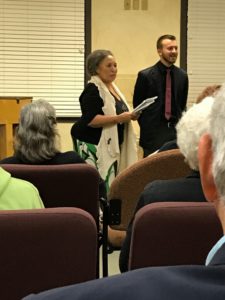
A few months later, Margaret returned to South Africa, with severe sciatica pain, making walking even hard. While in Southern Africa, her close Seventh-Day Adventist friend took her to a local clinic where she first encountered the NEWSTART health principles. She remarks: “It made perfect sense to me and [my friend] also taught me about the Sabbath. It was all very clear to me, so in October 2015, I chose to be obedient and observe the Sabbath. Looking back, that has been the most significant step taken, as a believer in God through His Son.”
In only 2 months, of having heard of the NEWSTART principles, she began to change her eating habits to conform to the principles she was learning. When it was time to head back to the US, the sciatica pain had completely disappeared. However, she didn’t have the stress management skills. Upon returning to the US, the stress, coupled with a further neglect of the principles she had just recently learned caused the pain to return with sever inflammation in her limbs. Walking became a problem. She was left with only one option: the NEWSTART program.
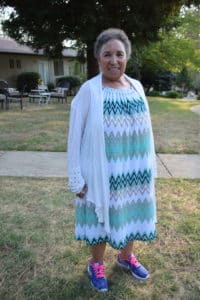
When Mrs. Margaret arrived at the program, she was in a wheelchair and couldn’t walk because of the intense pain. But as the days passed, she experienced remarkable improvement. Around the 12th day she was feeling better and by the 14th day, the pain in her back and legs was gone and she was walking again. She says, “I can see the power of God. No matter how long you have been messed up when God steps in [things change] … It is amazing!”
However, after leaving the program, sticking to the principles continued to be a struggle. That is primarily why, in the fall of 2018, Margaret decided to come to Weimar complete her personal health journey by joining the Health Evangelism and Leadership Training for Him (HEALTH) program. She comments, “These four months is exactly what I needed. I would say that I have stuck with [the NEWSTART principles] for about 95%. And I believe I’m going to continue. If I had not done this honestly, I don’t know where I would be in ten years. I’ve been given a new life.” One of the greatest encouragements that helped Margaret stick to the health principles was the examples of the physicians and staff who “practiced what they preached” by going walking early in the morning with students, participating in community lifestyle programs and adhering to the diets they recommended.
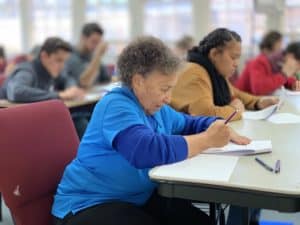
The key to her recovery? Education. She comments, “The greatest thing I have received is the knowledge of God-ordained way for us to live. And to know it’s actually all there in the Bible makes me realize that I have a responsibility to point people in the right direction. And now I’m pain-free. Praise the Lord!”
A pivotal point for Margaret came during one of the Diabetes Undone community programs put on by the HEALTH class. The speaker encouraged participants to develop an “ikigai” or an overarching life purpose.
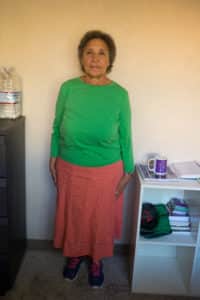
Margaret was deeply stirred by the message to live intentionally. For Margaret, that intentionality included: putting into practice the health principles she was learning, and sharing the information she was learning with those around her. Her entire ikigai can be summed up in three words—Saved to serve.
This greater intentionality has borne fruit. Margaret now walks up to 8 miles daily, has shed 35 lbs since coming to the program and says her memory is much clearer. Not only that, but her health age (a number calculated showing the physical age of an individual in terms of lifestyle habits) has dropped from 81 years to 52 years–something that Margaret is very proud of. Results are also being seen in her own family. She says, “You know, one of the greatest rewards is that my children have decided to go vegan, by themselves…because they saw me getting sick and depressed and they saw me come to NEWSTART and [now they see me] eat healthily. And they decided to go vegan by themselves. That is the greatest thing.”
***
This recreation of the physical, emotional, mental and spiritual is the driving force behind Mrs. Margaret’s story. It is an incredible testament to the power of the gospel to restore. This new lease on life is what propels Margaret forward every day to service.
Margaret is zealous about teaching people how to identify their poor health habits and teaching them how to correct them. Mrs. Margaret graduated from the HEALTH program on December 13th 2018.
In closing, she says: “I pray that I may serve God as a witness wherever He wants me to go.”


